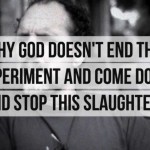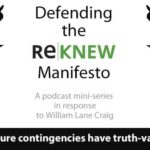We run our website the way we wished the whole internet worked: we provide high quality original content with no ads. We are funded solely by your direct support. Please consider supporting this project.
Dealing With Objections to Open Theism, Part II
There are four major objections to Open Theism. In this post, we are dealing with the third and fourth. (See yesterday’s post to read about the first two.)
Objection #3: God cannot foreknow only some of the future.
It is often argued that for God to be certain of anything about the future, he must be certain of everything about the future. This is an unfounded assumption. Sociologists, biologists, advertisers, and insurance agents accurately predict group behavior all the time without predicting what specific individuals will do.
Moreover, quantum physics, chaos theory, complexity theory, non-equilibrium thermodynamics, and other branches of science are now revealing that all of reality is structured as an interplay between determinism and spontaneity. Our own experience reveals the same thing. With every decision we make we reflect a deep conviction that some of the future is settled while some of it is unsettled, left up for us to decide.
In this light, we should have little trouble accepting that the sovereign God is able to foreordain and foreknow that Jesus would be crucified, for example, without having to foreordain or foreknow exactly who would carry this out (Acts 2:23; 4:27). Nor should we find it hard to accept that God can predestine and foreknow that he would have a beloved church without predestining or foreknowing which individuals will and will not choose to belong to his church (Rom 8:29; Eph 1:4-5).
Objection #4: The supposed “openness passages” in the Bible are merely examples of anthropomorphic language.
Many have argued that the passages to which Open Theists appeal for support can be explained as anthropomorphisms (i.e., depicting God in human terms). There is, however, nothing in any of these passages that suggest they are merely anthropomorphic. None of the texts suggest it is as though God changes his mind, regrets previous decisions, is surprised or disappointed, and so on. Nor is there anything in the rest of Scripture that requires or even warrants that we interpret all passages that depict a partly open future as anthropomorphic. Scripture describes God’s character as unchanging (Mal 3:6), but it never teaches that God is unable to change in any respect (e.g., his intentions, experiences). It teaches that the future is exhaustively settled to the extent that God wills it, but it never teaches that the future is exhaustively settled. And it teaches that God sometimes chooses not to change his mind (Num 23:19; 1 Sam 15:29; Ezek. 24:14) but never that he cannot change his mind.
Further, the passages cited in support of the open view do not readily lend themselves to an anthropomorphic interpretation. What does the concept of God “changing” his mind communicate if indeed it is merely an anthropomorphism? If God in fact never changes his mind, saying he does change his mind doesn’t communicate anything truthful: it is simply inaccurate.
Finally, interpreting openness passages as anthropomorphisms sometimes results in undermining the integrity of Scriptures. For example, Scripture says that because of Moses’ intercession, “the Lord changed his mind about the disaster that he planned to bring on his people” (Ex 32:14). If the Lord didn’t really change his mind, then neither did he really plan to bring disaster on his people. If this is merely anthropomorphic, then Scripture misleads us when it explicitly tells us what the Lord was planning before he changed his mind.
—Adapted from Across the Spectrum, pages 67-68.
Category: General
Tags: Across The Spectrum, Chaos Theory, Determinism, Objections to Open Theism, Open Theism, Probability
Topics: Open Theism
Related Reading

Divine Wisdom
Why doesn’t God end it all and stop the slaughter? Why does God allow suffering and evil to go on so long? Here, Greg offers two possible answers to these questions. Option A is that all evil somehow is designed by God and somehow brings glory to him. But Greg thinks Option B is a better explanation, and it involves…

Does The Open View Limit God?
Suppose you and I both agree that God is omniscient and thus knows all of reality, but we disagree over, say, the number of trees on a certain plot of land. I say there are 1,300 and you say there are 2,300. You wouldn’t say that I am limiting God because he knows fewer trees…

What is Open Theism?
Open Theism is the view that God chose to create a world that included free agents, and thus a world where possibilities are real. The future is pre-settled, to whatever degree God wants to pre-settle it and to whatever degree the inevitable consequences of the choices of created agents have pre-settled it. But the future…

Podcast: Defending the Manifesto (6 of 10)
Greg responds to challenges by William Lane Craig from Craig’s podcast “Reasonable Faith.“ Greg denies Molinism and discusses the logic of possibility. http://traffic.libsyn.com/askgregboyd/Episode_0061.mp3

How do you respond to Jeremiah 1:5
The Lord says to Jeremiah, “Before I formed you in the womb I knew you, and before you were born I consecrated you; I appointed you a prophet to the nations.” This verse shows God’s love and plan for Jeremiah before he was born. This does not imply that Jeremiah could not have “rejected God’s…

What’s the signficance of Judges 10:6-17
The Israelites rebelled against Yahweh and worshipped other gods. As a result, Yahweh withdrew his protection of them and “sold them into the hands of te Philistines and the Ammonites” (Judg. 10:6-7). The Israelites eventually acknowledged their sin and cried out to God (vs. 10) but Yahweh, perhaps perceiving that their repentance wasn’t genuine, told…

